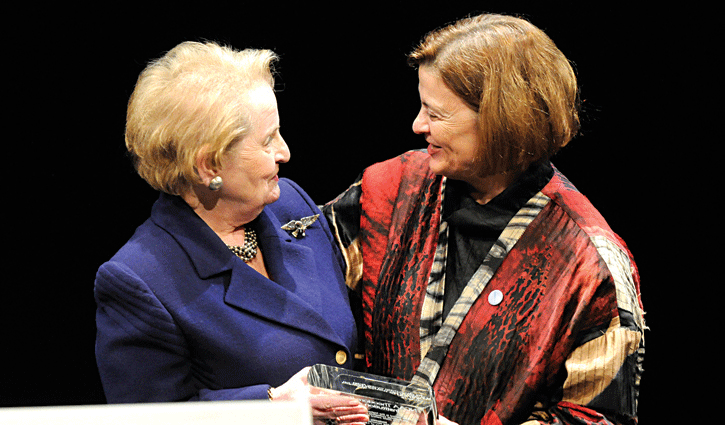Wellesley’s New Albright Institute Aims to Educate World Leaders
FOR IMMEDIATE RELEASE:
June 17, 2009 |
|
 |
Madeleine Albright, left, and Wellesley President H. Kim Bottomly |
WELLESLEY, Mass. – Wellesley College graduates are no strangers to the world stage. This preeminent women’s college has long educated its students to become global leaders. Now one of its most prominent alumnae, former U.S. Secretary of State Madeleine K. Albright, will help new generations of Wellesley women to make a difference in the world.
This January, Wellesley will launch the Madeleine Korbel Albright Institute for Global Affairs to heighten the global perspective of Wellesley’s academic environment and to prepare students for positions of world leadership. Albright herself will serve as the first of a series of distinguished visiting professors, sharing her vast experience as a diplomat and leader.
"We are witnessing a generational change in the American political scene,” said Albright, a member of the Wellesley class of 1959. “This is the right time—and Wellesley is the right place—to help train a whole new group of young women leaders to advance in that stream."
Albright is one of the most prominent diplomats in U.S. history, having served as secretary of state, representative to the United Nations and having worked in the National Security Council. Her leadership is both the inspiration and the foundation for the new institute.
“The Albright Institute will be a place where scholars and practitioners can gather to research, to reflect on, and discuss and debate global issues,” said Wellesley College President H. Kim Bottomly. “It will be a place that brings a focused international perspective to our liberal arts curriculum. It will be a place that will play a critical role in Wellesley’s education of future women leaders across the world.”
Each year, 40-50 Wellesley students — known as “Albright Fellows” — will participate in the institute. Their experience will begin with an intensive, noncredit three-week course, taught during January session by Wellesley professors, researchers from the Wellesley Centers for Women and experts in international relations and global policy from around the world. In the final week of the course, the Mary Jane Durnford Lewis ’59 Distinguished Visiting Professor (this year, Albright herself) will engage the students in a deeper, intensive study and exploration of global issues.
The following summer, Albright Fellows will participate in Wellesley-funded internships in the United States and abroad, applying what they have learned to experiences all over the world.
The institute will also host special events for the Wellesley College community. The distinguished visiting professors will bring their expertise into classrooms and lead informal discussions with student groups. Additionally, he or she will participate in faculty seminars on global issues. There are also plans to invite guest speakers on international relations.
All of these opportunities are just the beginning, said Dean of the College Andrew Shennan. For example, Wellesley may build connections with colleges and universities in other countries through the Albright Institute.
“The College has high ambitions for itself in relation to the world, and I expect that this initiative will be a foundation for other ventures,” said Shennan.
Albright believes in the importance of shaping the global future.
“In today’s world,” she said, “we are all neighbors.”
Since 1875, Wellesley College has been a leader in providing an excellent liberal arts education for women who will make a difference in the world. Its 500-acre campus near Boston is home to 2,300 undergraduate students from all 50 states and 68 countries.
### |

